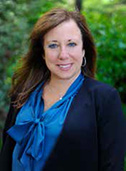Audrey Freshman Ph.D, explains the success of the continuing education workshops at Adelphi.
by Kurt Gottschalk
“The goal is to bring state-of-the art training to the community.” —Audrey Freshman, Ph.D. Audrey Freshman, Ph.D., director of Continuing Education and Professional Development, explained the success of the continuing education workshops at Adelphi University’s School of Social Work very succinctly.
Audrey Freshman, Ph.D., director of Continuing Education and Professional Development, explained the success of the continuing education workshops at Adelphi University’s School of Social Work very succinctly.
“We offer cutting-edge trainings from national and international experts and seek to provide participants with the very best experience,” Dr. Freshman said.
Dr. Freshman, who is also director of the Postgraduate Certificate Program in Addiction, came to Adelphi in 2011 and has been guided by the School’s goal to “enhance human service delivery and strengthen organizational capacity.” She started building an audience, collaborating with behavioral health practitioners and providers, building upon the school’s professional networks, and establishing new partnerships. “We are really mission driven, and our strategy has been to build an infrastructure for quality continuing education.
The school was well positioned to respond to the increased popular demand when New York State began requiring continuing education for social work license renewal in January 2015. “Adelphi was one of the first continuing education providers approved by New York State and we were able to ‘scale up’ quickly to respond to the needs and interest of our professional community,” she said.
The number of workshops the School presents per year has doubled, from six at the Garden City location in 2011 to more than 15 daylong workshops and certificate programs and conferences, as well as agency-based (customized) trainings across all four campuses, with more in the works.
“The goal is to bring state-of-the-art training to the community,” she said. “A lot of times, the speaker is someone who has advanced the field directly, not solely an interpretation of their work by someone else.”
For example, just this past season, Pauline Boss, Ph.D., presented her original work on the concept of “ambiguous loss.” The unresolved grief associated with losing a loved one who is still physically present due to Alzheimer’s or mental illness is not often acknowledged as a
sort of mourning. Dr. Boss’ work is aimed at helping practitioners see the loss clients can feel due to such difficulties, or in absences due to incarceration or prisoner-of-war status.
Another aspect of absence covered during the past year’s sessions came under the banner “The Distracted Couple: The Impact of ADHD Upon Adult Relationships.” That session covered the deep, if often joked about, problem of partners and family members who aren’t fully present due to compulsive use of social media or other technological distractions.
“It was about the very real relational difficulties resulting from a diagnosis of attention deficit disorder,” Dr. Freshman said.
Christine Courtois, Ph.D., a major contributor to the field of trauma, was another of last year’s distinguished presenters. Dr. Courtois has helped to advance the work on “complex trauma” that results from multiple exposures such as incest or witnessing repeated domestic violence. Like the distraction and ambiguous loss workshops, Dr. Courtois’ presentation provides enlightening and concrete concepts offering a positive utility for the attendees’ practices.
The coming year offers up-to-the-moment thinking on issues affecting gay, bisexual and transgender youth, as well as addiction in the Latino community. Also on tap is a look at the sanctuary model in therapeutic settings, where all employees of an agency are trained to present a unified front on behalf of the patient. Opportunities to learn Dialectical Behavioral Treatment Skills (DBT) and EMDR are also in the works. Sessions will be offered at each of the Adelphi campuses.
Dr. Freshman acknowledged the overwhelmingly positive response to the School’s programming. “It’s rewarding that our programs are so popular,” she said. “We are grateful for the opportunity to bring quality continuing education and professional development to the School’s professional community.”
This article appeared in Impact, the School of Social Work Newsletter.